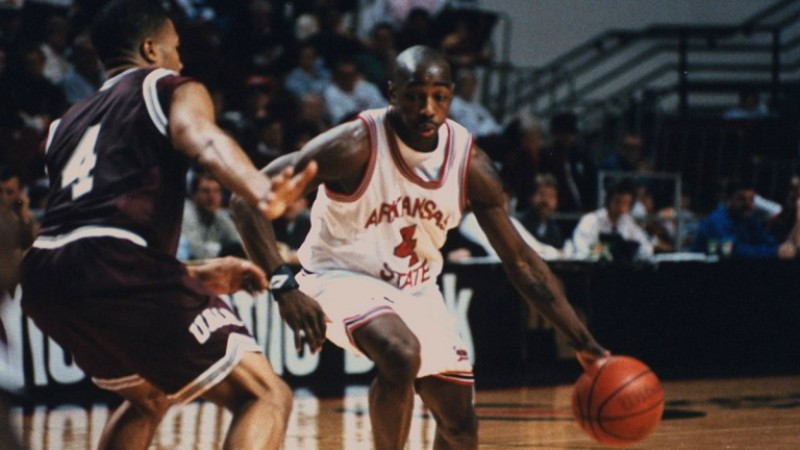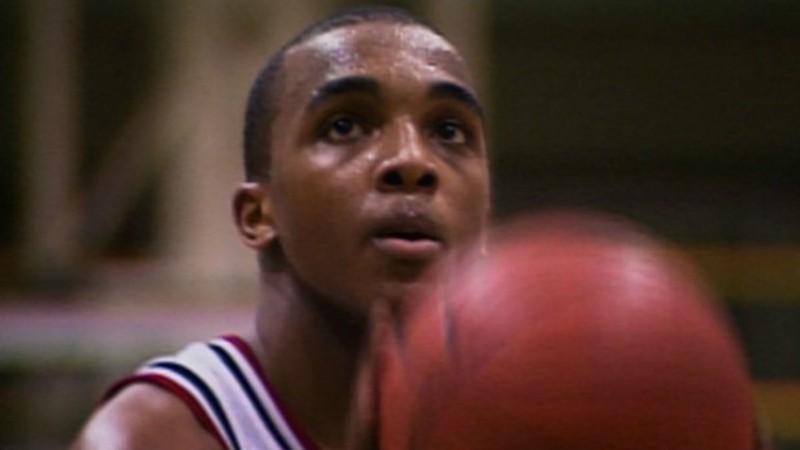




Twenty-five year since its release, Hoop Dreams has lost neither its nuance nor its relevance. The basic structure of the film, its rise-and-fall-and-rise-again narrative retains a distinctive elegance. This is not just a film about two high-school basketball players hoping to make it to the NBA. This is a film about challenging race and class orthodoxies in the US. It’s a film about the place sport has in the imagination and dreams of millions of people around the globe. And it’s also a film about how human love and talent become exploited.
Director Steve James started filming William Gates and Arthur Agee more than 30 years ago. They were just smart teenagers who were good at basketball. Recruited by the fee-paying St. Joseph’s school, their families were informed that, so long as they played well, they wouldn’t have to pay. Eventually, Agee has to return to an underfunded inner-city school, and the two players undergo contrasting fortunes as the stars of their respective schools. Gates is the golden boy hailed by all, but gradually brought low by injuries. Agee is the underdog lifting an underperforming team above its weight.

The Wasp, puritan work ethics embodied by St. Joseph’s head coach, Gene Pingatore (who passed away just a few weeks ago), a serial winner and highly respected sports coach, is very questionable. It drains the love and passion out of the young players. He reduces the sport to a series of set plays in which there is only ever one right decision, and that is the one the coach wants you to make. Make the wrong one, and you’ll get a volley of verbal abuse. Such coaches want to be chess-masters, but there’s too much chaos in most team sports to guarantee that level of control. In my opinion, this method of coaching has spread to almost all professional sports.
Both Agee’s and Gates’ families look upon St. Joseph’s with hope, as a route out of inner city poverty. When Agee is dropped from St. Jo’s, he also has to contend with his father falling foul to drugs and the law, whilst his mother loses her income and goes on welfare. The sense of responsibility and pressure he must have felt at the time is enormous. Yet he tackles his problems effectively. He doesn’t emerge an outright victor, but he’s a fighter, and does his best to get through it.
Steve James seemed to instinctively understand this. The camera is patient. The time that the director spent building up a relationship with both families is crucial to the film’s success. This cosy relationship also extends to the viewers.
The basketball footage is riveting. Even though this is a 25-year-old film relaying results that are 30 years old, my palms were sweating as James’ narration takes us through the story of each individual game. The poetry of sport is pervasive. Chaos has a habit of creating unbelievable narratives, seeping into the collective folklore of mass history.

Let’s not forget, however, the dark forces behind these stories: the dirty money, the non-remunerated players, the international skulduggery, and so on. Hoop Dreams reveals that sports are a route out of poverty for many, but also a bumpy road filled with dangerous turns and lies. For coaches it remains a means to an end. Either you become a winner or you get out. For the institutions, there’s more money being funnelled into the game than ever before.
The two protagonists find a glimmer of hope in the end of the movie. Both Gates and Agee enter college, and they talk about their dreams. Five years earlier, they have said “NBA” without hesitation. Now, they’re not so sure. Basketball has given a scholarship into college, and with that the springboard to something a bit more stable, if not quite as opulent as the promised land of the NBA. The way they speak of it suggests that they feel a sense of relief, that a burden has been released. Perhaps NBA isn’t the only way forward!
Hoop Dreams showed at Cinema Rediscovered in Bristol, and it’s out in cinemas across the UK on Friday, October 25th. On Mubi in June, 2020.
















